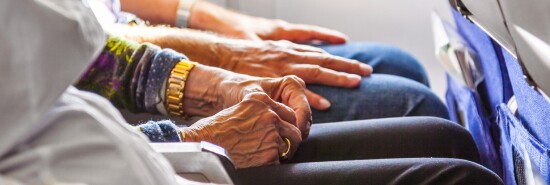
Airline etiquette: Trading seats to help a family sit together isn’t complicated
Timothy P. Carney
CHARLOTTE, North Carolina — On Thursday, I flew out here with my daughter on United Airlines. I was giving a talk at Belmont Abbey College, and my daughter was touring the campus as the early kickoff of her process of discerning her post-high school plans.
The thing is, the two seats we had on the Dulles-to-Charlotte flight were 32D and 32F — that is, the window and aisle seats in a row near the back of the plane. While boarding, the guy in front of us noted that he was 32E. I immediately asked, “Which would you rather have, the aisle or the window?” He replied, “Would you mind if I took the aisle?”
MOTHERS EXPRESS DISMAY OVER AIRLINE UNION PLANS TO SCRAP ‘LAP BABY’ SEATS
Not at all, I said.
My daughter was doubly happy because she got to look out the window for the entire flight (it was a perfectly clear day and was her third flight ever). Our row-mate was happy because he got to stretch his legs a tiny bit more and have a clear path to the bathroom. I was happy because I got to sit with my daughter and make two other people happy.
Somehow this whole subject matter, trading airplane seats with someone so he or she can sit with his spouse or child, has become a bit of a controversy. It need not be. A tiny bit of nuance is needed here, along with some basic humanity.
The first problem here is a stubborn, legalistic attachment to property rights. This is a widespread problem in American society, whereby people think if they plausibly have a property right, they will exercise that right fully to the letter of the law, with no accommodation for anyone else.
If you are on NextDoor, you probably see this when it comes to front lawns. I’ve had a neighbor complain that people let their dogs walk on his lawn. He wasn’t complaining that someone hadn’t cleaned up dog poop — that’s obviously a valid and righteous complaint. He wasn’t complaining that Fido was regularly peeing on his prized pansies. He was objecting to the fact that dog walkers regularly let their dogs trod on his grass.
Actually, in my old NextDoor group, there were at least two of these people, one of whom also complained that families on a walk would let their children run across his grass.
If we were all robot lawyers (with robot dogs), this guy would be right. But we are humans, and we realize that while property rights and rules are necessary for happiness, fairness, and social peace, an overly strict adherence to boundaries in certain circumstances neither maximizes happiness and social peace nor reflects justice and reasonability.
The same problem applies to airplane seats. Yes, if you buy a particular seat, you are entitled to that seat. But again, just because you have a property right doesn’t mean you ought to exercise it or that it’s unreasonable for someone to ask you to give it up. If you want a prime example of someone who doesn’t get that, read this New York Times letter:
“I am an organized person. When I travel, I book my flights well in advance. This usually lets me claim my preferred seat: on the aisle in the bulkhead row. I have long legs, and those seats tend to provide more legroom — not that I have to justify myself. This brings me to my problem: The last two times I’ve flown, a steward asked me to change seats to accommodate a parent flying alone with small children. My moving would allow them to sit together. But I didn’t want to move! (They could have booked in advance, too.) So, I politely refused. Several passengers made nasty comments. Was I wrong to hold my ground?”
Yes, sir or ma’am, you are the jerk in this case. Look how childish this sounds: “I didn’t want to move!” You should move simply because being a grown-up means putting other people first sometimes. If you want a more utilitarian argument, you should move because you having your preferred seat is less of a big deal than this small child getting to be with his or her parent. (As every parent knows, the very existence of small children smashes any philosophy that holds property rights, autonomy, and individualism as sacred goods.)
But again, there’s a nuance here. In my case on Thursday, I was the one asking another man to give up his seat. So, yes, I was the one asking a favor — he didn’t have to switch if he didn’t want to. So I didn’t rely solely on “please don’t be a jerk.” I instead offered him something of value. In this case, I said, “Which would you rather have, the aisle or the window?”
Most of the time, if a family has two or three seats that are not together, at least one of those seats will be preferable or roughly equal to the seat another person is being asked to give up. A smart flight attendant, in fact, will shuffle things so that the father and daughter end up together but in two crummier seats, and the people who moved end up in better seats. (Pre-COVID, on some airlines, they were even known to give a free beer to voluntary seat-switchers for being good sports. I don’t know if airlines continue to do that.)
This might violate some people’s sense of “I bought this seat, it’s mine,” but those people are just wrong.
